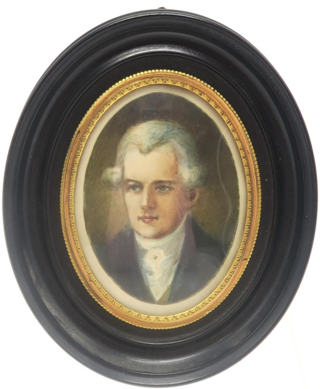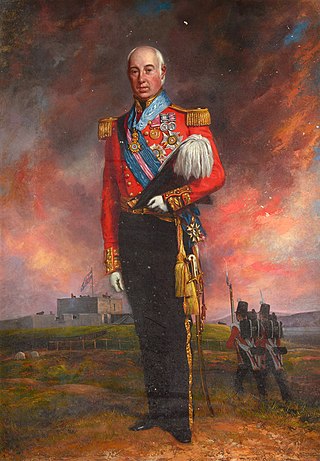Related Research Articles
Baron Ventry, of Ventry in the County of Kerry, is a title in the Peerage of Ireland.

The Errington Baronetcy, of Ness in the County Palatine of Chester, was created in the Baronetage of the United Kingdom on 26 June 1963 for Sir Eric Errington, 1st Baronet.
Sir Rowland Blennerhassett, 4th Baronet was a Roman Catholic Anglo-Irish baronet and Liberal Party politician from County Kerry.

The Blennerhassett Baronetcy of Blennerville in the County of Kerry, is a title in the Baronetage of the United Kingdom. It was created on 22 September 1809 for the Anglo-Irish lawyer Rowland Blennerhassett, He was from a family originally from Cumberland, England, that settled in County Kerry during the reign of James I and represented County Kerry and Tralee in the Irish House of Commons.
The Jervoise, later Clarke-Jervoise Baronetcy, of Idsworth in the County of Southampton, was a title in the Baronetage of the United Kingdom. It was created on 13 November 1813 for Rev. Samuel Jervoise, born Samuel Clarke, who assumed the surname of Jervoise by royal licence in 1808.
The George Baronetcy, of Park Place in the County of Middlesex and of St Stephen's Green in the County of Dublin, was a title in the Baronetage of the United Kingdom. It was created on 18 September 1809 for Captain Sir Rupert George, First Commissioner for Conducting the Transport Service married Magaret daughter of Thomas Cochrane by his first marriage, and their daughter Charlotte married 28 February 1820 her cousin Richard Verity of Dean House, Huntington. The title became extinct on the death of the second Baronet in 1856. The Georges were a County Laois family, whose estate was at Clophook near Stradbally.

The Sheppard, later Cotton-Sheppard Baronetcy, of Thornton Hall in the County of Buckingham, was a title in the Baronetage of the United Kingdom. It was created on 29 September 1809 for Thomas Sheppard. He married Elizabeth, daughter of Reverend William Cotton, through which marriage Thornton Hall came into the Sheppard family. Their son, the second Baronet, assumed by Royal sign manual the additional surname of Cotton in 1806. The title became extinct on his death in 1848.
The High Sheriff of Kerry was the British Crown's judicial representative in County Kerry, Ireland from the 16th century until 1922, when the office was abolished in the new Free State and replaced by the office of Kerry County Sheriff. The sheriff had judicial, electoral, ceremonial and administrative functions and executed High Court Writs. In 1908, an Order in Council made the Lord-Lieutenant the Sovereign's prime representative in a county and reduced the High Sheriff's precedence. However, the sheriff retained his responsibilities for the preservation of law and order in the county. The usual procedure for appointing the sheriff from 1660 onwards was that three persons were nominated at the beginning of each year from the county and the Lord Lieutenant then appointed his choice as High Sheriff for the remainder of the year. Often the other nominees were appointed as under-sheriffs. Sometimes a sheriff did not fulfil his entire term through death or other event and another sheriff was then appointed for the remainder of the year. The dates given hereunder are the dates of appointment. All addresses are in County Kerry unless stated otherwise.

The Bayntun-Sandys Baronetcy, of Miserden Castle in the County of Gloucester and of Chadlington Hall in the County of Oxford, was a title in the Baronetage of the United Kingdom. It was created on 26 September 1809 for Edwin Bayntun-Sandys (1774–1848). He had been born Edwin or Edwyn Sandys, but had assumed the additional surname of Bayntun. He did so, by Royal sign manual, in 1807. The change was in order to inherit from the will of William Bayntun (1717–1785), a lawyer of Gray's Inn and husband of his first cousin once removed, Catherine Sandys (1737–1804).
Major-General Sir James Kyrle-Money, 1st Baronet was a British soldier and landowner.

Sir William Godfrey, 1st Baronet (1739–1817) was an Anglo-Irish member of the Irish House of Commons.
Thomas Mullins, 1st Baron Ventry was an Anglo-Irish politician and peer.
Sir Barry Denny, 1st Baronet was an Anglo-Irish politician. The Denny family effectively owned the town of Tralee.
Sir Barry Denny, 2nd Baronet was an Anglo-Irish politician, chiefly remembered for his death in a duel at the hands of John Gustavus Crosbie.

The Blennerhassett family is an English and Anglo-Irish noble family which has been involved in the politics of the Britain and Ireland since the fourteenth century. The male line of the family is extinct in Britain.
Lancelot Crosbie was an Anglo-Irish politician.
John Gustavus Crosbie was an Anglo-Irish politician, mainly remembered for killing another Member of Parliament, Sir Barry Denny, in a duel in 1794.
Arthur Blennerhassett Rowan, (1800–1861) was a Church of Ireland cleric, Archdeacon of Ardfert from 1856 to 1861, known also as an antiquarian writer.
Sir Alexander Charles George Leith, 1st Baronet (1741–1780) was a British soldier and politician who sat in the House of Commons between 1774 and 1780.

General Sir Charles Bulkeley Egerton was a British Army officer that served in the French Revolutionary Wars and Napoleonic Wars, He would command a brigade in the 5th Division during the Peninsular War.
References
- 1 2 John Debrett, Debrett's Baronetage of England: with alphabetical lists of such baronetcies as have merged in the peerage, or have become extinct, and also of the existing baronets of Nova Scotia and Ireland (J.G. & F. Rivington, 1835), 347.
- ↑ John Debrett, The Baronetage of England (F.C. and J. Rivington, 1819), 1178-9.
- ↑ "No. 16293". The London Gazette . 29 August 1809. p. 1384.